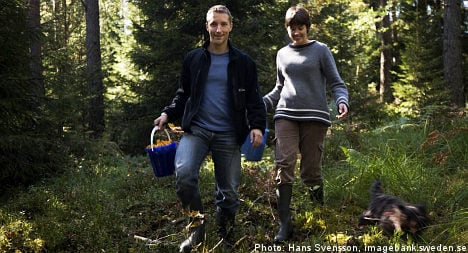“Proud spring arises; the weak call it autumn.” Turn-of-the-20th-century poet Erik Axel Karlfeldt was oiling his hiking boots when he wrote that. Autumn is when the Swedish brain clicks into warpspeed: ideas are born, books are opened, DIY seriously considered, evening classes thirsting for discoveries launch. A brief mourning period for the brief summer ends abruptly.
The woods are full of blueberries/bilberries, cloudberries and the prince of them all, the lingonberry or cowberry. It is a little cousin of the cranberry family, used as a savoury preserve. Try it with pan-fried Baltic herring.
The benzoic acid in the berry is a natural preservative, and lingon is time-honoured as a summer berry easily kept for winter use. Widespread poverty prompted Swedish ingenuity to use pickling, drying, curing, smoking and fermenting to store food. A common modern trick is to marinate raw salmon, gravlax.
(Gravlax recipe. Buy a chunk of filet. Extract any bones with tweezers. Rub with equal units of sugar and salt and half a unit of chopped dill. Plastic-bag it in your fridge, turning occasionally, for 2-3 days. Scrape off marinade. Skin, cut into cutlets and garnish with fresh dill. Lemon boats alongside.)
Like their cranberry cousins, lingonberries are harvested in the forest with small rakes. Wily entrepreneurs fly in teams of pickers from as far off as Thailand and China.
September is wild mushroom season. Hunting and picking them is a national infatuation. The fungi have wondrous names: Parasol mushroom, Horn of Plenty, Shaggy ink cap, Saffron milk cap, Woolly milk cap. Dinner favourites are the Cep, the Morel and the Chanterelle. Watch out for the deadly Fly agaric and the instructively named Death cap.
Mushroomers say their hikes through dripping forests, mud underfoot, are escapades into nature. They come back beaming.
It’s the beginning of the apple and pear harvest. Swedes accept as gospel that Swedish apples are superior to those of any other geography. It’s a good argument, considering the delicate Transparant Blanche, the crisp Åkerö and the fragrant Aroma.
Every fourth year in September, voters can choose national candidates for the single-chamber Riksdag as well as regional and local government. Parties need 4 percent of the popular vote for Riksdag representation. Voting is proportional, so policy often takes precedence over individuals’ profiles. Election campaigns are brief. The most conspicuous sign is the (detachable) posters on city lampposts and handrails. On the day, about 70 percent of eligible voters stuff their three envelopes with the coloured lists available from officials or, as you approach the polling station, from volunteers or even political celebrities. Respect for politics and politicians shifts, but single-issue or malcontent parties have difficulty surviving. Just under half of all parliamentarians are women.
In the south, the deciduous trees are turning yellow and red. But 80 percent of Sweden’s trees are spruce (Picea) with needle-like evergreen foliage. Well over half the country is covered by forest. The tallest tree is the pine. Sweden’s greatest natural resource (alongside iron ore) came from Asia before the Ice Age. The great forestry barons, entering banquet halls on horseback, are no more, but paper is still a mainstay industry. Way back, woodcutters used to slash pines a year before felling. This induced the tree to produce extra resinous sap to heal the wound, giving durable timber.
September is a month of several seasons. Summer lingers on the plains and littorals of the southern provinces, but it’s autumn for most of the rest and already winter in the highlands of Lapland. Temperatures diverge by as much as 40 degrees Celsius. In Europe only Russia has such a latitude span. Birds are taking off literally and figuratively for the south. At least 90 percent leave, the arctic tern taking three months for its trip all the way to the Southern Ocean. It’ll be back.
The Year in Sweden by Kim Loughran is on sale now at the AdLibris online bookstore.



 Please whitelist us to continue reading.
Please whitelist us to continue reading.
Member comments